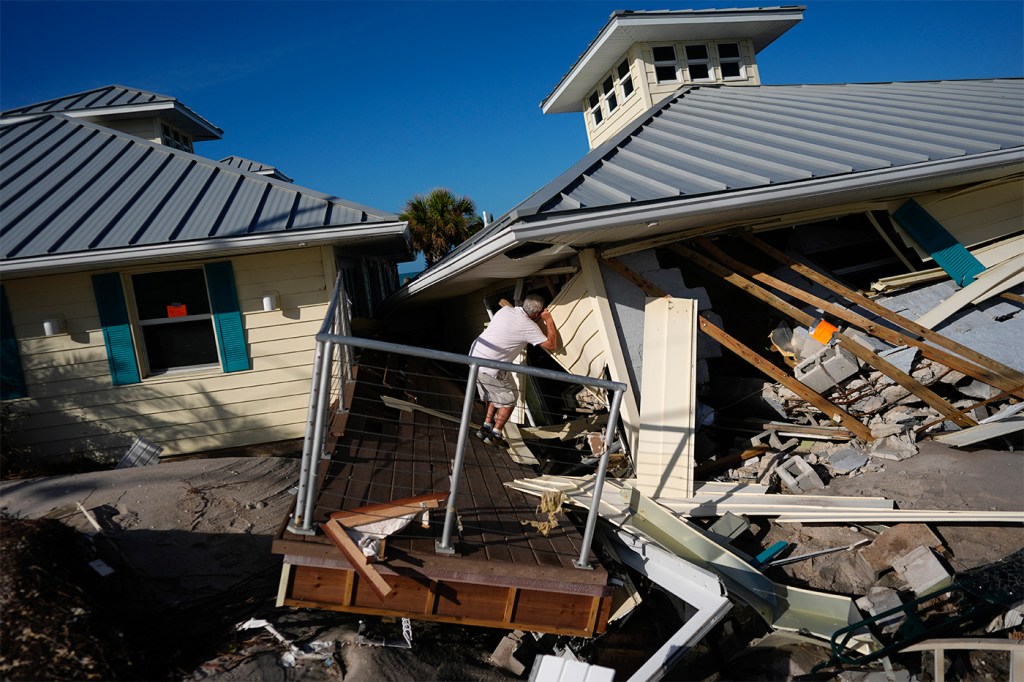What changes can Florida residents expect to their insurance policies following the recent hurricanes?

As Florida residents clean up after yet another damaging hurricane, many are rereading their insurance policies and preparing claims.
Meanwhile, homeowners there should expect a more expensive and changing insurance marketplace in the future, a Northeastern University insurance expert says.
“Premiums will definitely be increasing, and who provides that insurance will be changing for homeowners, especially in the most vulnerable areas such as Florida, Texas and anywhere in the Gulf of Mexico area,” says Weiling Liu, an assistant professor of finance at Northeastern’s D’Amore-McKim School of Business.
Hurricane Milton slammed into Florida’s west coast south of Tampa Bay on Oct. 9 as a Category 3 storm.
Damage from the storm and tornadoes it spawned is predicted to be “a double-digit billion-dollar loss event,” and the largest insured loss for any U.S. natural catastrophe this year, according to Mark Friedlander with the Insurance Information Institute, an industry association.

Friedlander predicted, however, that the losses would not reach the $50 billion to $60 billion cost of Hurricane Ian in 2022.
At least 24 people are confirmed dead from Milton.
Moreover, Milton came within weeks of Hurricane Helene, which is expected to cost residents and business owners in the southeast $47 billion in property damages.
The state of Florida is already in an insurance crisis, with lawmakers scrambling for solutions.
“I think that Florida might be like the poster child of property and casualty going forward,” Liu says.
Liu explains that several factors are at play in the Gulf of Mexico region insurance market.
First, the increased severity of storms due to climate change has caught insurance companies’ eyes — and coffers. Several major insurance companies have left Florida, citing this increased risk due to storms.
Second, the region is growing fast. It was the fastest-growing coastline region between 2000 and 2017, adding more than 3 million people and counting — many of whom are drawn to a more affordable coastal region. That region, however, is often in the floodplain — particularly for the most affordable houses.
Liu says the result is that homeowners are increasingly finding the only private insurance they can get — if they can get it — is from smaller, regional, less capitalized providers.
Featured Posts
However, there are a few problems with this, Liu explains.
With fewer customers, small regional insurers have to jack up premiums to meet anticipated losses. Moreover, fewer customers and a weak balance sheet may mean that they have less capital available in the event of a major payout.
“As of now, I don’t think there’s any concern that they would immediately stop paying out losses,” Liu says. “But in the future, if enough insurers exit the space, that could either mean sky-high prices or you won’t be able to recoup all your losses — they’re probably going to cap you at how much you’re actually going to be able to get back.”
Moreover, if the smaller insurers can’t pay out, they may have to declare bankruptcy and liquidate, exacerbating the problem.
That being said, the state of Florida — like all states — regulates insurance rates. Conceivably, its state insurance regulator could set a cap on rate increases.
But Liu says that the power, in this circumstance, is in the insurance companies’ favor.
“I think regulators are afraid of no one being left to supply this insurance in the future,” Liu says.
So, what can be done?
Government subsidies are already available for mandatory flood insurance, Liu says. But she adds that research has suggested that mandatory subsidies create unintended consequences in the form of reduced lending, especially to low-income and low-FICO score individuals, in the mortgage market by big banks.
“I don’t know if that’s a long-term solution to have the government subsidize more homes,” Liu says.
That being said, because flood insurance is subsidized by the government, Liu thinks it unlikely that all insurance companies would leave the state.
The market may just need to take higher insurance costs into consideration.
“It might just be that this is something that people need to get priced in,” Liu says. “Maybe it does make sense for the market to adjust and price that in, so going forward, those properties will have lower values and higher maintenance costs associated with them.”
Which could mean quite a shock for the housing market, and a big shift in the migration of future would-be homeowners.
“Are things going to get more expensive to live in Florida? I think so,” Liu says. “And the house values out there are going to drop a lot once people price in this risk of flooding.”











